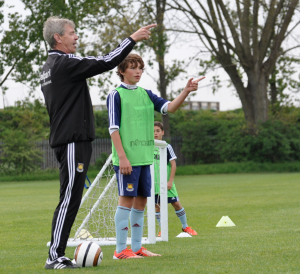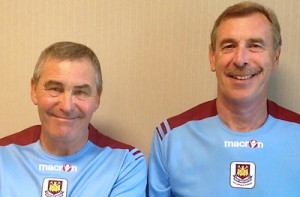West Ham United Academy Assistant Director Paul Heffer on Player Development
On March 18, 1967, defender Paul Heffer took the pitch for West Ham United alongside the legendary Bobby Moore. Over the next several years, Heffer helped patrol the backfield for the Hammers, until an injury cut his playing career short. But it did not end his career with the club, where he would go on to become a coach and eventually Assistant Academy Director at West Ham United Academy.
Over his 35 year career as a player and coach, Heffer has become as much a part of the Academy’s legacy as Director Tony Carr. Seven current England Men’s National Team players have come through the Academy during Heffer’s tenure, along with numerous professionals. In addition, he is responsible for the West Ham United International Academy outreach program to America, helping to identify talented U.S. players.
The newest focus at West Ham is “Play the Game in the Future” – a focus that puts the emphasis on thinking ahead and planning, rather than simply reacting to events on the pitch. Recently Heffer sat down with SoccerNation News editor Diane Scavuzzo to share his views on coaching, player development and “playing the game in the future.”
Diane Scavuzzo: Is there a Holy Grail, some secret to successful player development?
Paul Heffer: There is no shortcut to player development; it is practice. And you have to make sure it is the correct practice – suitable to be used in the game. Training that can be applicable so that everything learned can be used in a game.
Diane Scavuzzo: How exactly do you accomplish this?

Paul Heffer: West Ham has a very focused training program; every tactical and technical skill and training can be directly applied to a game situation.
Diane Scavuzzo: What does the new Play the Game in the Future slogan mean?
Paul Heffer: It means players should look for danger, check their shoulder, look for spaces and know what they are going to do when they receive the ball before they get it. Players need to know if they are going to dribble or play one- and two-touch.
Soccer is very much like a game of chess. You should always be one or two steps ahead, always be thinking a couple a moves ahead.
Diane Scavuzzo: How do you try to impart wisdom in soccer?
Paul Heffer: It is all done through the drills and training sessions.
Diane Scavuzzo: Has the Academy at West Ham United changed over the years?
Paul Heffer: Change can be very good, and the game of soccer is always evolving. Here at the academy, for instance, we have grown from nine trainers to over 100 working. The EPPP is still in its infancy and we will see how it works.
Diane Scavuzzo: Some of the drills look more simple and repetitive than what the players may do in the USA. Why is that?
Paul Heffer: if you keep changing the drills, it takes longer for the players to learn what they have to do. Performance has to be taken to a standard of excellence.
The players have to be taught the mechanics. It is the actual performance of the drill and the technical content of the drill that are so important. It’s like a dance class – when you learn a piece for a performance you do not keep changing the music or the steps. I believe players need to learn the basics first, and then comes the technical ability.
Diane Scavuzzo: In America, and even here in England, many coaches seem to be looking at their career paths when they are coaching teams, and so they focus on winning tournaments and showcases. Here at West Ham, when you and your staff look at a player in front of you there is a serious focus on that individual player and bringing out the best in that player. This is very different than at many other football clubs.
Paul Heffer: We are here for the players, and we are here for the long haul. We are happy to be doing what we are doing. If promotion comes, that’s fine, but everyone is here to produce players within the group they get. There is no winning culture here – it is a culture of development.
Here at West Ham we focus on developing the players up to the age of 15. If we are developing the boys properly – developing them professionally – they will win more than they will lose. And they may even develop into great first team players.
Diane Scavuzzo: How do you know if a coach is doing the right job?

Paul Heffer: The coach must show me that he is teaching the boys within the session and not showing me what he knows.
Diane Scavuzzo: Why do you have these international teams of youth players come to visit and train at West Ham?
Paul Heffer: I think it is beneficial for our coaches to take a group of kids that are not part of a professional club and see if they can improve them in four or five days; that is the challenge. The difference at the end of the five days has always been a lot. The difference is in their mental approach to the game.
Diane Scavuzzo: These young American players work closely with you and the West Ham United Academy coaches, and I know you coach their teams when they take on the Academy teams. How are they doing?
Paul Heffer: The American players are doing very well. In fact, we recently had history in the making, so to speak. “We” – meaning the American team I coach – actually won 3-0. The American U15 Elite International Team of boys beat the West Ham Academy three weeks ago, although they were playing down a year against the West Ham U14 boys.
I have done nine years of getting absolutely hammered all the time in these games, and I was pleased. Our West Ham boys probably should have played better, but it goes to show what the Americans can do. We identified some very talented boys during the National Camp in Rome, Georgia, last summer, and we did a good job training them.
Diane Scavuzzo: How is the International Girls’ Team performing?
Paul Heffer: The girls are out of this world. The moving and passing have been brilliant.
Diane Scavuzzo: There are players who have been “discovered” through these youth soccer programs. When you identify youth soccer players, what do you look for?
Paul Heffer: We look for athletic ability and technical ability, and a player has to show he has a “football brain.”
Diane Scavuzo: What is most important?
Paul Heffer: The football brain is responsible for so much of a players success. Football is played in the head. But to answer your question, the complete player has to have a piece of everything. It is the whole build up of the player; his personality, his character, his drive to be a success and never giving up. A player has to really want to be successful. He – or she, as I should say – has to have the drive needed.
As I have often said, give us the bricks and we can add the cement to build up the complete player. But the building blocks have to be there. Perhaps you can make a player a bit quicker, you can make him strong but without that football brain, he will never be one of the top players.
Diane Scavuzzo: Can you ‘get’ a football brain?
Paul Heffer: I don’t think you can get a football brain; it has to be there and you build on it. And also keep practicing. Practice the right way. Many people say practice makes perfect, but it my mind practice makes permanent and if you are practicing the wrong things you are not going to be perfect. Just remember, “Play the Game in the Future” is our focus and that just about sums it all up.
Diane Scavuzzo: How long have you been developing players?
Paul Heffer: I started coaching when I was 24 years old through an injury, and now I am 67 years old – so do the math, as they say.
Diane Scavuzzo: What is your favorite part of doing this?
Paul Heffer: Just being with the boys.
I have coached a bit with the first team, but that was with adults and trying to get results. I knew I wanted to develop players and see what I could put into them and get results.
Diane Scavuzzo: What teams do you enjoy watching?
Paul Heffer: I got to admit I do not like watching any particular team. I enjoy watching good football. So if I think a team is working well this season, I will watch them – I just like watching good football and football that reflects the way I coach.
Diane Scavuzzo: Who do you think has been doing well this season?
Paul Heffer: Liverpool – I have enjoyed watching Liverpool this year and also Manchester City for a spell. I think they died a little bit from the pressure of being at the top.
Diane Scavuzzo: What do you think will be the impact of having West Ham United move to the Olympic Stadium in London in 2016?
Paul Heffer: I think the move will bring more funds into the club and probably more attention as well.






